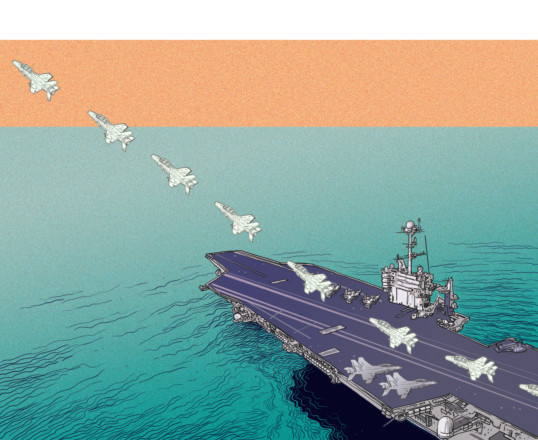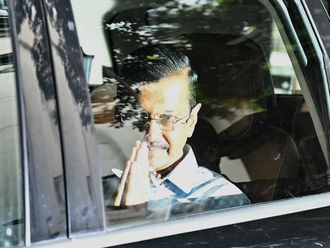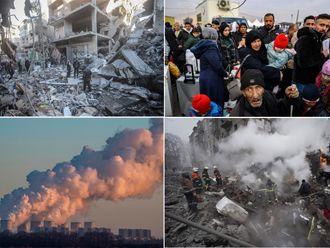
The entire world feels deep sympathy for the people of Belgium, where a coordinated series of terrorist attacks killed 31 people and maimed many others. The attacks were deliberately indiscriminate and the dead had no connection whatsoever to anything to do with Daesh (the self-proclaimed Islamic State of Iraq and the Levant), who carried out the attacks. The murdered people were normal people going about their daily lives in Brussels, and their killers sought to create panic and mayhem by their random deaths.
At such a time, it is important to remember that action is being taken against Daesh every day by the armed forces of the international coalition of more than 60 nations, which is fighting the terror group in Syria and Iraq under Operation Inherent Resolve, of which the UAE is an active and significant member. Speaking on board the aircraft-carrier USS Harry S. Truman briefly in Jebel Ali Port this week, while on a tour of duty in the Gulf, the admirals in charge of the American fleet and the strike group were warm in their praise for the UAE servicemen fighting alongside them, quoting their professionalism and dedication to the task.
There is not much reporting of the large scale of the fighting going on in Iraq and Syria, so it was a shock to be welcomed on board by US servicemen who had been in action over Iraq two days before, and were about to return in a few days. The fighter pilots spoke of flying around 60 to 70 hours a month as the USS Truman launches daily actions to target Daesh sites.
The logistics of such action are formidable. At the start of the day, more than 60 planes, including several squadrons of F18s, take off at a maximum rate of one every 45 seconds. They fly for six or seven hours, which requires them to refuel several times high in the air above Iraq and Syria, where large tanker planes circle at predetermined sites 24 hours a day to pump fuel into the fighters.
The American pilots who had been in action spoke warmly of flying alongside warplanes from a wide variety of coalition nations, and were high in their praise for their partners in the task of degrading the Daesh sites and so enabling the ground advance to happen.
The large scale of what is going on is often not very clear as the confusion of the war on the ground tends to dominate the reporting, as does the troubled local politics, which in the end will have to pick up the pieces. But as an example of what is happening, a routine statement on Monday from the US Department of Defence said that recent coalition strikes on bridges about 50 miles (80.46km) south of Mosul have limited Daesh’s ability to sustain its fighters east of the Tigris River, and coalition forces have struck at Daesh headquarters and a weapons manufacturing facility in Mosul. Political element
It also announced that in Syria, the coalition’s Operation Tidal Wave II had hit 117 targets to date, focusing on stopping Daesh oil production and distribution, and so hamstringing its ability to fund terror operations. All this action goes on day by day for months, and its incremental effect is substantial with powerful long-term strategic effect.
But the military struggle against Daesh must also include a political element, which was made very clear in the UAE’s statement of sympathy to Belgium and condemnation of the Daesh attack. Dr Anwar Mohammad Gargash, UAE Minister of State for Foreign Affairs, first expressed the UAE’s condemnation of these cowardly terrorist acts, which targeted innocent civilians, reiterating the UAE’s determined stance and rejection of all forms of violence and terrorism that target all races and religions indiscriminately.
He ended by expressing the UAE’s condolences to the Belgian government and people and wished the wounded a speedy recovery, after which he called for concerted efforts by the international community to work at eradicating all forms of terrorism. This call was matched by that of US Secretary of State John Kerry, who said that “attacks like these only deepen our shared resolve to defeat terrorism around the world”.
It is important that as the world reacts to the tragedy in Brussels that follows so many other grim moments in other countries, and as the coalition military works to defeat Daesh, there has to be a strong political and intellectual alternative to Daesh’s nihilism. This is why it was interesting that when US Ambassador Barbara Lake spoke on the USS Harry S. Truman, she took the time to praise the work of the Sawab Centre in Abu Dhabi, which has been set up to counter Daesh’s potent online propaganda.
The Centre’s work is designed to help give voice to the wishes of the vast majority of moderate Muslims who reject Daesh’s ideology and sensational brutality and are united with their partners around the world in support of a stable and prosperous Middle East that is free from the scourge of extremism.
Bringing the Arab world back to stability needs this complicated combination of tough military action against Daesh, coupled with the long-term social and political steps to rebuild society once the territory is reclaimed.



_resources1_16a45059ca3_small.jpg)





